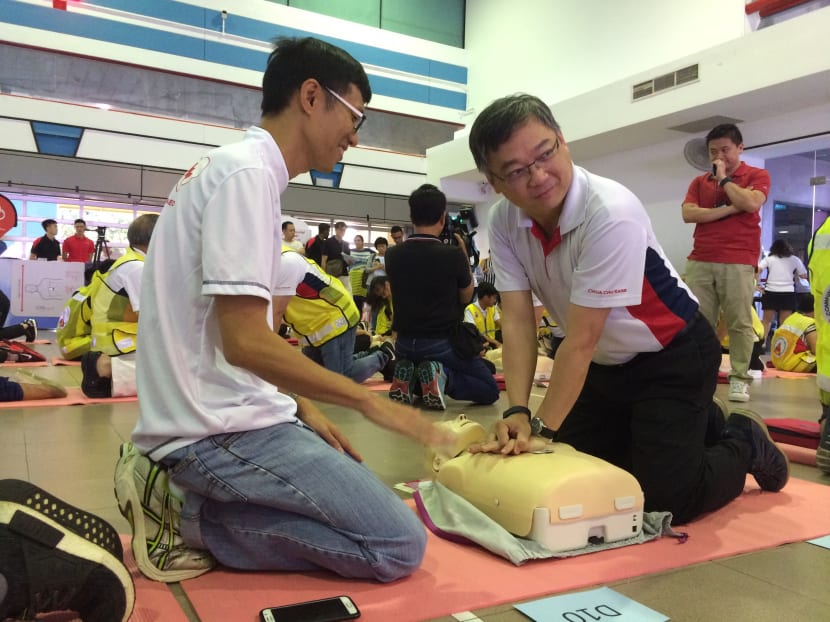New device could help save more cardiac arrest victims
Singapore — A new device, the size of a credit card and slightly thicker, is the latest tool that could improve the efforts of the public in saving the lives of cardiac arrest victims before an ambulance arrives.

Health Minister and MP for Chua Chu Kang GRC Gan Kim Yong practising cardiopulmonary resuscitation using the CPRcard, a device that gauges quality of chest compressions, at the Chua Chu Kang Health and Sports Carnival. 200 residents received the CPRcard yesterday after training. Photo by Neo Chai Chin
Singapore — A new device, the size of a credit card and slightly thicker, is the latest tool that could improve the efforts of the public in saving the lives of cardiac arrest victims before an ambulance arrives.
Fitting easily into most wallets or pockets, the CPRcard provides users with on-the-spot feedback and could boost the confidence of those performing cardiopulmonary resuscitation (CPR) on people whose hearts have stopped pumping blood.
The battery-operated device is placed on the victim’s chest before CPR commences. It allows users to see if the chest compressions they are giving are deep and fast enough to keep the victim’s blood flowing.
About 4,000 CPRcards have been given out since late last year to those who participated in Dispatcher-Assisted first REsponder (DARE) training that included the use of the device.
The Health Ministry’s Unit for Pre-Hospital Emergency Care (Upec) wants to distribute another 11,000 by August next year.
All 15,000 cardholders will be part of the world’s first community trial that aims to evaluate if the devices have helped members of the public become more confident about rendering chest compressions and have led to good-quality CPR.
Under the two-year study, researchers will also follow up with cardiac arrest survivors to see how they are doing, said Upec medical director, associate professor Marcus Ong.
The CPRcards, a collaboration with Norwegian medical equipment company Laerdal Medical, were given to 200 Choa Chu Kang residents who underwent training on Sunday (June 11).
Cardholders are required to download the myResponder app so they can be alerted by the Singapore Civil Defence Force (SCDF) to cardiac arrest cases nearby, said Assoc Prof Ong.
The CPRcards have been used in six real-life cases so far. They are equipped with memory chips, allowing the experts to provide responders with feedback on how they fared.
The authorities can also gather data on the average quality of bystander CPR and whether volunteers are being trained correctly.
Data from the real-life responses show that bystanders tend to deliver chest compressions too quickly, at a rate of up to 140 a minute, faster than the ideal of 100 to 120, said Assoc Prof Ong, a Singapore General Hospital emergency physician.
“The American Heart Association’s campaign for CPR is ‘push hard, push harder, push faster’,” he said. “Maybe the message for us in Singapore ... is ‘relax, push harder, push at 100 (compressions) per minute’.”
While technology to track the quality of chest compressions is not new, they were typically in the form of clunky equipment or phone apps, he said.
“I’ve to balance (the phone) on my hand and actually do CPR. And phones are not getting smaller, they’re getting bigger and fatter and heavier.”
The CPRcard battery can last about two years, which is also the duration of a first-responder certification.
If used continuously, the battery lasts for 30 to 40 minutes, more than ample for the 10 minutes or so that an ambulance takes to arrive. Responders are asked to pass their CPRcards to paramedics after using them, and they will receive a replacement.
More than 2,000 cardiac arrests occur out-of-hospital in Singapore each year, and the rate has increased by between 5 and 10 per cent annually over the past decade, said Assoc Prof Ong. At least seven in 10 cases occur at home, while the rest occur in public places.
Only four in 10 out-of-hospital cardiac arrests here receive bystander CPR before paramedics arrive. In some countries, the rate is up to 80 per cent.
According to a 2010 census, about 10 per cent of the population has current CPR training.
The target in three to four years’ time is for 20 per cent of Singaporeans to be trained in giving CPR or in the use of automated external defibrillators, said Assoc Prof Ong.
Bystanders may worry about doing something wrong and contributing to a victim’s death, but he said: “You can’t do any worse than doing nothing. If you do nothing, the person has a 98 per cent chance of dying.”
Health Minister and Member of Parliament (Chua Chu Kang) Gan Kim Yong, who was at his constituency’s Health and Sports Carnival on Sunday, said the CPRcard will be rolled out to other constituencies over time.
With more people trained to do CPR, the chances of victims being saved would go up, he said: “To do (CPR) correctly is also important to ensure the CPR they administer is effective in saving lives while waiting for the arrival of the ambulance and SCDF team.”
Mr Gan’s CPRcard score: Chest compressions delivered at the right pressure and rate 95 per cent of the time. A score of 80 per cent and above is considered good.
CORRECTION: In an earlier version of this story, we reported that 4,000 CPRcards had been given out since late last year to those who participated in Disaster Assisted First Responder (DARE) training that included use of the device. DARE actually means “Dispatcher-Assisted first REsponder”. We are sorry for the error.









